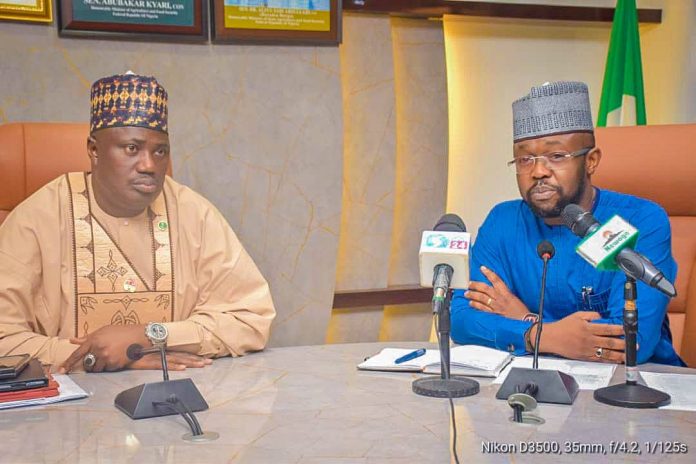The federal government has inaugurated the National Executive Committee on the Implementation of the Nigeria Farmers’ soil health card scheme to enhance agricultural productivity and ensure a food-secured future for the country.
Minister of State for Agriculture and Food Security, Sen. Dr. Aliyu Sabi Abdullahi, in his speech during the event held in Abuja recently, said that the inauguration of the Committee was a vital initiative that would shape the future of Nigeria’s agriculture and would stand as a pivotal initiative aimed at integrating principles of agroecology and regenerative agriculture, in line with the vision of President Bola Ahmed Tinubu, for a ‘strongly revived and vibrant agricultural sector.
He noted that the Nigeria Farmers’ Soil Health Card Scheme (NFSHCS), administered by the Federal Ministry of Agriculture and Food Security (FMAFS) for Sustainable Agriculture, would emphasize the promotion of site-specific and crop-specific sustainable soil health management practices, along with the careful application of fertilizers.
The Minister, pointed out the objectives of the initiative include; define appropriate soil fertility management practices, improve soil health and fertility, improve extension and advices on fertility management and fertilization, employment generation for rural youth amongst others.
Sen. Abdullahi commended the committee members for their dedication and expertise, stressing that their collective efforts would be instrumental in shaping policies, programs, and initiatives that would promote sustainable soil management practices.
Speaking further, the minister stated that the programme was expected to span over a period of four years in the first instance, pointing out that “the activities from now will culminate with the formal launch of the Soil Health Card Scheme by President Bola Ahmed Tinubu in the last quarter of this year following his final approval.
“I therefore want to charge this committee to work collaboratively to achieve our goals, engage stakeholders, foster partnerships, drive innovation and knowledge sharing, and ensure inclusivity and equity for a successful Soil Health programme under the Renewed Hope Food Security initiatives,” he said.
In his remarks, Director Agricultural land and Climate Change Management Services Department, Mr. Oshadiya Olanipekun revealed that the establishment of soil testing laboratories would be created across the 774 local government areas, which would invariably create job opportunities, introduce single window approach for collection and building of data base to be able to identify the right farmers, amongst others.
In his goodwill message, the representative of Deutsche Gesellschaft fur Internationale Zusammenarbeit (GIZ), Dr. Andrea Ruediger commended the Government and the Ministry for the bold and proactive step, he stressed that for many decades there had been talk about the need for farmers to have the soil testing and today it has come to reality.
The Committee’s Terms of Reference (TOR), include carrying forward the objectives of the scheme for project evaluation, implementation and monitoring; Identifying beneficiaries (Laboratories) especially from States/local Government Areas (including private sector) in a transparent and time bound manner; submit the proof of basic laboratory facilities and equipment/inputs as per provisions and norms to Director of Agricultural Land and Climate Change Management Services Department (ALCCMS) and forward the same to the Honourable Minister through the Permanent Secretary for distribution of Atomic Absorption Spectroscopy (AAS) and Water purification System to beneficiary laboratories, amongst others.
Members of the National Executive Committee include Mr. Oshadiya Olaonipekun as FMAFS Chairman.
Others are: Dr. Andrea Ruediger, GIZ-Sustainable Agricultural System & Policy (AgSys), Sandra Oken FMAFS (FDA), Dr. Deola Lordbaju FMAFS (Extension), Abana Waziri Abba FMAFS (FISS), Yekeen Olukayode Rasaki FMAFS (AHS), Haruna Abdulhamid Yusuf FMAFS (PCU), amongst others.


